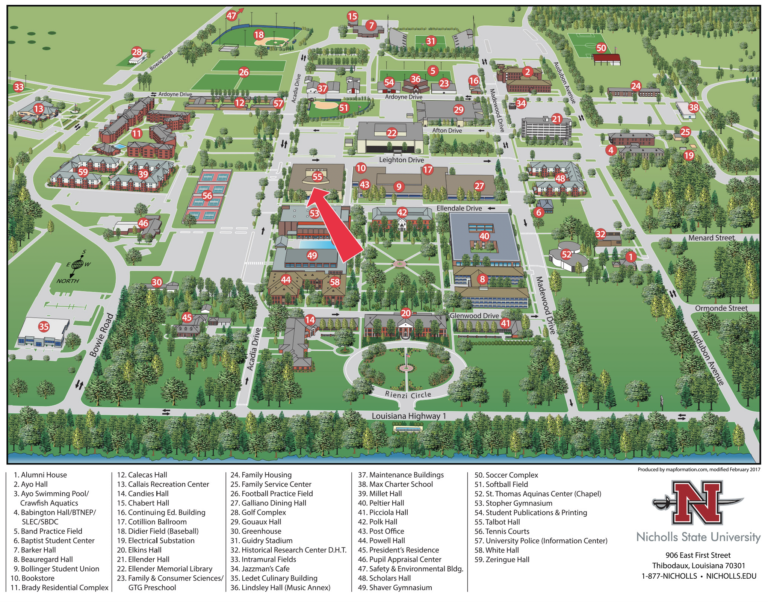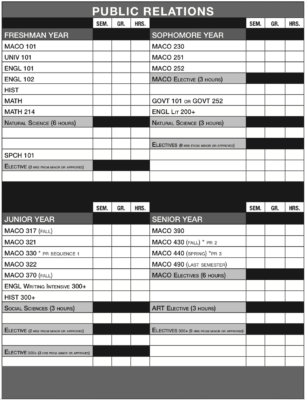Academics
DEPARTMENT MENU
Department of Mass Communication
degree programs
majors
COURSES
Core
- MACO 101 – Survey of Mass Communication
- MACO 230 – Visual Communication
- MACO 251 – Writing for Mass Communication
- MACO 252 – News Reporting
- MACO 321 – Multimedia Storytelling for Mass Communication
- MACO 322 – Publication Design
- MACO 370 – Mass Communication Law and Ethics FALL ONLY
- MACO 390 – Internship or MACO 388 Practicum
- MACO 490 – Digital Media Convergence (Capstone course)
Journalism
- MACO 326 – News Editing SPRING ONLY
- MACO 362 – Broadcast Media Workshop FALL ONLY
- MACO 401 – Broadcast Journalism SPRING ONLY OR
- MACO 451 – Features FALL ONLY
- MACO 455 – Public Affairs Reporting SPRING ONLY
- 9 hours of MACO Electives
Public Relations
- MACO 317 – Public Relations Writing SPRING ONLY
- MACO 330 – Public Relations
- MACO 430 – Public Relations Practice and Case Studies FALL ONLY
- MACO 440 – Public Relations Campaigns SPRING ONLY
- 9 hours of MACO Electives
Electives for Mass Communication Majors
All majors must complete 26 hours outside of the major as either a minor or or electives.
Note: At least 12 hours must be at the 300-level or above
Minors
Mass Communication
- MACO 101 – Survey of Mass Communication
- MACO 251 – Writing for Mass Communication
- MACO 370 – Mass Communication Law and Ethics
- 9 hours of MACO Electives
Speech
- SPCH 101 – Fundamentals of Public Speaking
- 15 hours of Speech Electives 9 hours must be 300-level or above
Academic Resources
CAPP (Curriculum, Advising and Program Planning) is a degree evaluation tool to assist you and your advisor to track and monitor your progress toward completion of your degree. It provides a review of your Nicholls coursework, transfer work, and in-progress courses detailing curriculum requirements that are met and have not been met.
CAPP is designed to aid you as you progress toward completion of your degree. It may help answer
• How long will it take for me to graduate?
• Am I on schedule for graduation?
• Can I add a minor?
• A minor is required for my degree. How’s my progress with the minor I selected?
• What if I want to change my major?
The Degree Evaluation allows you to run a What-If Analysis to create a sample degree audit so that you can see what requirements have been met or need to be fulfilled for the program selected.
Degree Evaluations do not take the place of academic advising and are unofficial documents. It is necessary to obtain final approval for graduation from your academic department.
The degree evaluation is not an official transcript or academic record. Students are responsible for the selection of courses for the knowledge and completion of all degree requirements appropriate to their program of study as listed in the University catalog.
Frequently Asked Questions:
How do I access Degree Evaluation and process my degree audit?
• Login to Banner Self Service
• Select Student Tab
• Select Student Records
• Select Degree Evaluation
• Select the term for which the evaluation is to be processed
• Your Current Curriculum Information will be displayed
• Select What-If Analysis at the bottom of the page
• Select the catalog term, click Continue. All programs, undergraduate and graduate, are available from the 2011 and 2012 University catalogs. Catalog years begin with the fall semester.
• Select from the list of programs available, click Continue.
• Select the program that appears in the First Major* drop down box, click Submit.
• Click Generate Request
• View your Degree Evaluation Report
What does the Degree Evaluation Report contain? The What-If Analysis contains specific requirements for the program you chose. The Program Description, Catalog Term, Evaluation Term, and Results as of (date) are displayed at the top of the report. Each program is broken down into areas with details within that area. Most programs have a minimum of three areas: General Education, University Core, and Major requirements. Additional areas are concentration, electives, upper-level requirements, and minor.
Does CAPP use all my courses? The degree evaluation searches through all courses taken at Nicholls, current in-progress course work, and transfer work that are included in your academic record at Nicholls to fill the selected curriculum’s requirements. Excluded courses include those withdrawn (W), incomplete courses (I), developmental courses, repeated courses, and courses that do not meet the minimum grade as specified by the University or department where the curriculum is housed. Excluded courses can be viewed in the Courses Not Used section near the bottom of the report.
Why are courses I am currently repeating not showing in my degree evaluation? When a course is listed in your academic history and is not marked as a repeated course (excluded), CAPP attempts to use that course to meet the requirement. If the course is graded with a grade lower than the minimum grade (F, I, etc.), the course will not meet the compliance requirement and will not be displayed. Once the registered course is graded and the earlier course is marked as excluded, CAPP will be able to attempt to use the new course (included).
What is the difference between my Program GPA and the Overall GPA? The Program GPA includes courses that are used for this specific evaluation. Graduation is NOT based on the Program GPA. The Overall GPA is the student’s cumulative GPA at the time of the evaluation. It includes repeats and poor grades. However, an overall adjusted GPA of a least 2.0 is needed for graduation (undergraduate), as defined by the general requirements listed in the University catalog. Your overall adjusted GPA can be determined by processing the “Undecided” major for graduation purposes when needed. As with the Overall GPA, the “Undecided” GPA is based on the student’s completed coursework at the time the evaluation is processed. The “Undecided Non-Degree” major can be found in the Program drop down box when running a What-If Analysis.
How do I process an evaluation report for a minor? Select the “What-If Analysis” then from the Program drop down box select “Z MINOR check for degree audit.” This program will process your academic course work for all minors available in the catalog term chosen for the audit.
How often should I process my evaluation? The degree audit process is dynamic, meaning that each time you change your major, drop/add classes, add transfer work, and when final grades are posted there may be changes to your degree audit. You can review your progress or run a new What-If Analysis as often as you like, but you will only see changes once one or some of these processes take place.
My advisor told me a course would substitute for another. Why don’t I see it in the report? Course substitutions require an approval process. Check with your advisor to make sure the necessary paperwork has been submitted for approval.
I still have questions about my degree progress and the report. Who should I contact? You should contact your academic advisor to discuss your degree progress and the Degree Evaluation Report.
MACO 101 – Survey of Mass Communication
Print, broadcast, advertising and public relations and their roles in American society; the concept of freedom of the press; the relationship of press and government and of the press and the public; theory, criticisms, problems and ethical concerns of the media.
Semester Offered: Fall & Spring
PRE-REQ: None
MACO 230 – Visual Communication
Familarize students with processes for conveying meaning through the use of images and in
conjuntion with text.
PRE-REQ: None
Semester Offered: Fall & Spring
MACO 251 – News Writing
Researching and writing news, with emphasis on accuracy, brevity, clarity.
PRE-REQ: Freshman English
Semester Offered: Fall & Spring
MACO 252 – Reporting
Advanced newsgathering, news writing and interviewing techniques.
Semester Offered: Fall & Spring
PRE-REQ: MACO 251
MACO 261 – Photojournalism
Camera techniques and picture editing for publication.
PRE-REQ: None
Semester Offered: Spring
MACO 271 – Broadcast News Writing
Lecture and practice in researching, gathering and writing broadcast news.
PRE-REQ: MACO 251
Semester Offered: Periodically
MACO 317 – Public Relations Writing
Fundamentals of public relations writing including news releases, internal communications, and persuasive writing.
PRE-REQ: MACO 251, 252 & SPCH 101
Semester Offered: Spring
MACO 321 – Multimedia Storytelling for Mass Communication
Information gathering and production technologies for new media with emphasis on theoretical underpinnings. Software technologies including social media, desktop publishing, photojournalism, web development and video production and their application in mass communication strategies. Meets computer literacy requirement.
PRE-REQ: None
Semester Offered: Fall & Spring
MACO 322 – Publication Design for Mass Communication
Emphasis on desktop publishing. Production of publications with a personal computer and laser printer using word processing, media graphics, spreadsheets and interactive page layout.
PRE-REQ: None
Semester Offered: Fall
MACO 326 – News Editing
Fundamentals of editing for newspapers and related publications; layout; copy reading and headline writing.
PRE-REQ: MACO 252 & 230 or 322
Semester Offered: Spring
MACO 330 – Public Relations
Effective use of promotion, publicity, advertising, research techniques, internal and external publications and the news media.
PRE-REQ: None
Semester Offered: Fall & Spring
MACO 350 – Web Design for Mass Communication
Explores the fundamentals of design for the Web, working with online content management systems and the computer-based tools used for Web design. The course integrates elements of design with specialized software packages.
PRE-REQ: None
Semester Offered: Fall
MACO 355 – History and Principles of Mass Communication
The development in the United States of newspapers, magazines, radio, television, advertising and public relations; ethical principles of American journalism.
PRE-REQ: None
Semester Offered: Spring
MACO 361 – Television Production
Basic procedures for coordinating cameras, microphones, sets, lights and videotapes.
PRE-REQ: None
Semester Offered: Fall
MACO 362 – Broadcast Media Workshop
Practical experience in electronic newsgathering and production techniques.
PRE-REQ: None
Semester Offered: Spring
MACO 370 – Law and Ethics of Mass Communication
Legal and ethical concerns affecting publishing, advertising, broadcasting and public relations.
PRE-REQ: None
Semester Offered: Fall & Summer
MACO 380 – Advertising Copy and Layout
Advertising fundamentals, copy, layout and production.
PRE-REQ: MACO 230 or 322
Semester Offered: Periodically
MACO 388 – Practicum
Mass Communication major and junior/senior standing. Students will intern in a news, public relations or advertising capacity with an on-campus entity. S or U is assigned upon completion.
PRE-REQ: Junior Standing & department head approval
Semester Offered: Spring, Summer, Fall
MACO 390 – Internship
Mass Communication major, junior/senior standing and permission of department head. Students will have the option to intern in a news,
public relations or advertising capacity at an off-campus entity. S or U is assigned upon completion.
PRE-REQ: Senior Standing & department head approval
Semester Offered: Spring, Summer, Fall
MACO 397/398/399 – Independent Study
Study or project coordinated by instructor in conference with student. One, two, or all three courses may be taken. Must be approved by the adviser before registration. Can be repeated for credit.
PRE-REQ: Adviser approval before registration
Semester Offered: Spring, Summer, Fall, Winter
MACO 401 – Broadcast Journalism
Theory, research, concepts, skills and tools basic to radio and television journalism, including news department operation and news program production
PRE-REQ: MACO 361/271
Semester Offered: Fall
MACO 402 – Broadcast Journalism Workshop
Practical experience in radio and television news writing, videotape news story production, and television news graphics production.
PRE-REQ: Credit for or registration in MACO 401
Semester Offered: Spring
MACO 430 – Public Relations Practice and Case Studies
Theory, research, concepts, case studies, and the execution of regular and special projects.
PRE-REQ: MACO 252, 230/322 & 330
Semester Offered: Fall
MACO 440 – Public Relations Campaigns
Planning, researching, developing, executing, analyzing, and evaluating public relations campaigns.
PRE-REQ: MACO 430
Semester Offered: Spring
MACO 451 – Feature Writing
Writing feature and special articles for newspapers and magazines.
PRE-REQ: MACO 252 or 271
Semester Offered: Fall
MACO 452 – Women and Minorities in the Media
Representation and presentation of women and minorities in the mass media.
PRE-REQ: Junior Standing
Semester Offered: Fall & Spring
MACO 453 – Media Research
Mass communication research methods, including focus groups, surveys, content analysis, statistics, copy testing, audience research, computer application and evaluation.
PRE-REQ: MACO 101
Semester Offered: Spring
MACO 455 – Public Affairs Reporting
Practical application in researching, news gathering and news writing principles with emphasis on public affairs reporting.
PRE-REQ: MACO 252 or 271
Semester Offered: Spring
MACO 471 – Communication Theory
Introduction to the development of significant communication theories, including basic concepts in social science research methodologies, the history of major theoretical models and prevailing theories and approaches. There will be intensive writing in this course.
PRE-REQ: C or better in ENGL 102 and Senior Standing
Semester Offered: Periodically
MACO 480 – Advertising Concepts and Strategies
Theory, research and analysis of campaigns and media outlets; the execution of regular and special projects.
PRE-REQ: MACO 380
Semester Offered: Periodically
MACO 485 – Environmental Communication
Researching, creating, and disseminating content on environmental issues; may include journalism, public relations, and other elements of science communication; includes the execution of regular and special projects.
PRE-REQ: C or better in ENGL 102 and Senior Standing
Semester Offered: Periodically
MACO 490 – Digital Media Convergence (capstone)
Theoretical and practical instruction incorporating audio, video, and graphics in a multimedia environment.
PRE-REQ: Final semester
Semester Offered: Spring & Fall
MACO 499 – Seminar in Contemporary Mass Communication
Discussions on various aspects of mass communication. May be repeated for credit if content differs.
PRE-REQ: None
Semester Offered: Periodically
In addition to the financial aid and scholarships programs available to the general student body, about $17,000 in scholarships and prizes is awarded annually to full-time majors in Mass Communication. Most awards represent the interest on endowment funds totaling almost $375,000.
You can apply for MACO scholarships every semesters by filling out the forms available in the Department of Mass Communication Office at 102 Talbot Hall.
Scholarships
CONGRESSMAN BILLY TAUZIN SCHOLARSHIP of $625 a semester is awarded to a sophomore, junior, or senior in Mass Communication specializing in public relations. Applicants must have at least a 3.0 grade-point average, and a recipient must maintain that average for the scholarship to be renewed. The scholarship was established by the Propane Education and Research Council.
CLAUDIA BONVILLAIN SCHOLARSHIP of $400 a semester is awarded to an outstanding Mass Communication major who can demonstrate an interest in advertising. It was established by the Houma Courier.
COMMUNITY BANK SCHOLARSHIP of $1,000 a semester is awarded to an entering freshman from Louisiana majoring in Mass Communication. The scholarship is renewable as long as the recipient maintains at least a 2.75 grade-point average each semester. The recipient is chosen by the University Scholarship Committee after considering applications from entering freshmen who are graduates of a Louisiana high school.
WALLS SCHOLARSHIPS are awarded to Mass Communication students who are high school graduates from Lafourche, Terrebonne or St. Mary parishes, and who are pursuing courses of study in print journalism or advertising. Second priority is given to students of any parish or state. About seven scholarships of $700 a semester are awarded, and each is renewable if minimum requirements are met.
JOHN B. GORDON MEMORIAL SCHOLARSHIP is awarded to a full-time student specializing in print journalism. First priority goes to a student planning a newspaper career and who lives in Terrebonne Parish or who is a graduate of a Terrebonne Parish high school. Second priority goes to high school graduates from anywhere. A 2.0 grade-point average is required. The scholarship pays about $300 a year.
COURIER-COMET JOURNALISM SCHOLARSHIP each year goes to a graduate of a public or parochial high school in Terrebonne Parish. The award is based on need, scholarship, and demonstrated interest in print journalism and consists of $400 a semester.
BOB BLAZIER BROADCAST SCHOLARSHIP is awarded to a full-time Mass Communication junior or senior in broadcasting who has at least a 2.5 GPA. Applicants must demonstrate the hard-work ethic exhibited by Bob Blazier, a former faculty member.
LOWREY SCHOLARSHIP of about $300 a year is awarded to a Mass Communication major on the basis of need, grade-point average and professional potential.
Awards and Prizes
BONNIE TOUPS WELLS FEATURE WRITING PRIZES of $350 and $150 are given each December by the Wells family of Houma to the Mass Communication students who submit the best feature stories of at least 1,000 words on any aspect of Louisiana French or Cajun culture. Entries must have been published in a newspaper or magazine on or off campus during the year.
ALFRED DELAHAYE AWARD is presented to the outstanding Mass Communication graduate of the academic year. The recipient, chosen by the Mass Communication faculty, receives an engraved plaque and a prize of at least $200.
CLARENCE DOUCET REPORTING AWARD (an engraved plaque and $200) is presented each May to a Mass Communication major. A judge determines the winner on the basis of three stories published on or off campus between April 1 and March 30; an entry consists of one hard-news story, one feature and one story of the entrant’s choice. Doucet was managing editor of the Houma Daily Courier in the 1970s. The award is sponsored by John Gravois, 1980 Mass Communication graduate and government editor of the Forth Worth Star-Telegram.
OUTSTANDING GRADUATING SENIOR IN EACH SPECIALTY. Every spring the faculty in each specialty names the outstanding graduating senior in Broadcast Journalism, Print Journalism and Public Relations.
CONTACT INFORMATION
Department of Mass Communication (MACO)
Office Location
102 Talbot Hall
Mailing Address
PO Box 2031, Thibodaux, LA 70310
Phone
985.448.4586
fax: 985.448.4577
Dr. James Stewart, Head
CAMPUS LOCATION




